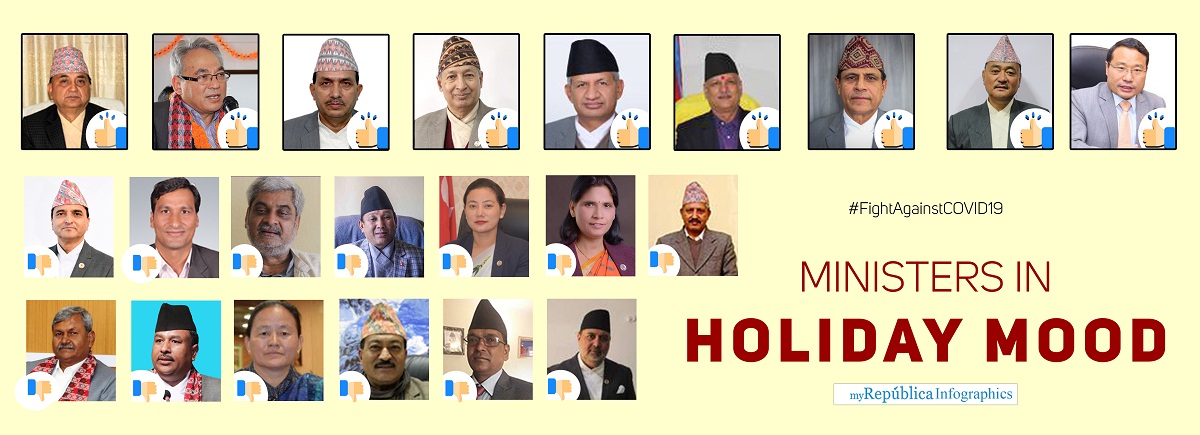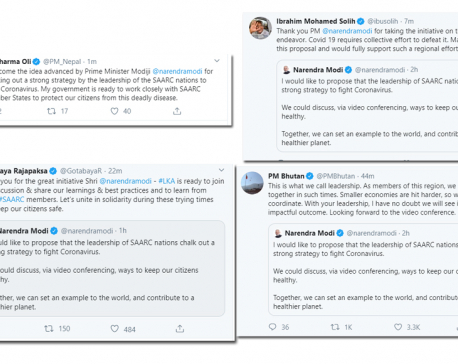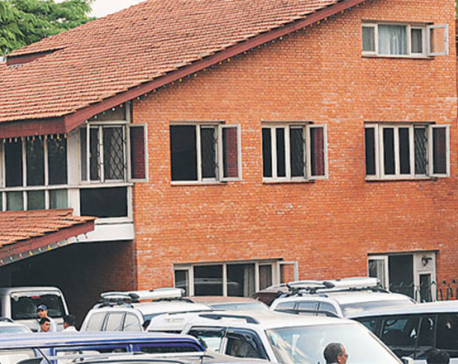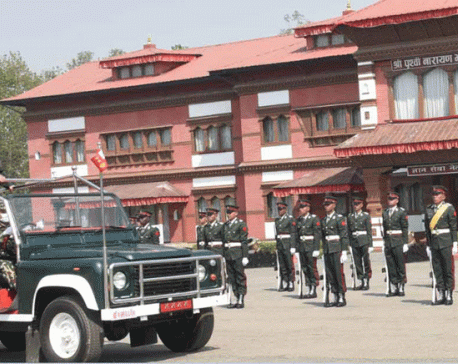
OR
Ministers in 'holiday mood' as country plunges into deeper crisis
Published On: April 18, 2020 12:20 PM NPT By: Republica | @RepublicaNepal

KATHMANDU, April 17: Prime Minister KP Sharma Oli has 22 ministers, including three junior ministers, in his cabinet. But as the country expects the government to help people hit-hard by the prolonged nationwide lockdown, a majority of the ministers are nowhere to be seen in action.
While the ministers for defense, home, health, finance, supplies, energy, agriculture and foreign affairs appear on the frontlines to help tackle the threats of COVID-19, several other ministers are mostly staying idle at home, as if the lockdown is a period to take a break from their regular duty. People have started questioning their conspicuous silence and sheer inaction to those in need, even as the government continues to adopt stricter measures to enforce lockdown with the rising number of COVID-19 cases.
With 14 more people tested positive on Friday, the number of people tested positive for COVID-19 has reached to 30 in Nepal. And, there are indications that the government will extend the lockdown that was first enforced on March 23 for an indefinite period, throwing the life of ordinary people across the country out of gear.
Deputy prime minister and defense minister Ishwar Pokhrel has been coordinating all government responses against COVID-19 right since the outbreak of this pandemic in Nepal. Minister for foreign affairs Pradeep Gyawali is also active on the frontline in this battle. He has been reaching out to his counterparts in countries where Nepalis have been badly impacted by the pandemic and facilitating government’s efforts to solicit external support to fight against the pandemic at home.
Despite courting some controversies over the procurement deal of essential medical supplies with Omni group, health minister Bhanu Bhakta Dhakal is also on the frontline, personally taking initiative to oversee arrangement of medical facilities and managing necessary resources to tackle the crisis.
Minister of finance Yuba Raj Khatiwada, who is also entrusted with the ministerial portfolio of communication and information technology, has been the public face of the government in recent months. He has been briefing the press and also taking in charges of the finance ministry in this difficult time.
Minister for agriculture Ghanshyam Bhusal, Minister of energy Barsha Man Pun and Minister of industry and supplies Lekh Raj Bhatta are also working to ease the day-to-day life of farmers and others hard-hit by the prolonged lockdown. Minister of physical planning Basanta Nembang has launched a drive to blacktop major roads in Kathmandu and other major roads across the country.
However, several other ministers in the cabinet are nowhere to be seen, despite the fact that there are a number of things that each ministry can do to help ease day-to-day life of people during this health emergency.
Analysts say respective ministers should work to assess the impact of the COVID-19 and come up with innovative strategies to cope up with the challenges in the post-COVID-19 scenario. Let alone working on studying the impact of the crisis, most ministers have not even sat down to discuss the issues with the concerned stakeholders. Almost a month has passed since the government first enforced the nationwide lockdown on March 24.
While the government is being criticized for not helping the poor who are trying to return home and those stranded in various places along the Nepal-India border, there are a number of areas where the concerned government ministers have failed to take even minimum action. For instance, massive amounts of agricultural produce have gone to waste on a daily basis in many places and farmers have not been able to harvest their crops.
Supply of daily essentials in major cities, including Kathmandu, has not been smooth, resulting in a steep price hike of the daily commodities. Daily wage earners, who lost their job and have no other sources of income, await government support. A large number of elderly people, children and people with physical disabilities have been especially hit-hard by this prolonged lockdown.
Minister for drinking water Bina Magar, minister of land management and poverty alleviation Padma Kumari Aryal, minister of culture, tourism and civil aviation Yogesh Bhattarai, minister of forests and environment Shakti Bahadur Basnet, minister of education Giriraj Mani Pokhrel have not been very active in the last three-plus weeks of lockdown. Millions of students are out of school, and the education ministry has been sitting idle during this time. Minister of labor Rameshwar Ray Yadav should have been working closely with the foreign minister to help Nepali workers in the Middle East and elsewhere. As millions of Nepalis living in and around the poverty line slide back to poverty, minister Aryal is nowhere to be found.
Although some efforts are being made by local governments to help ease the life of ordinary people, federal ministers do not seem to have taken any initiative to ensure proper coordination between the local level governments and provincial governments. Lack of coordination has made the lives of those braving long walks home worse.
Republica tried to contact several cabinet ministers, but they were either not reachable or were not available to talk about their works. A cabinet minister who agreed to talk to Republica on the condition of anonymity, however, argued that some ministers are not working because of the nature of their portfolios.
"For example, the minister for sports and minister for land reforms have less significant roles to play at this point. It is natural that these ministries cannot be seen working like the home or health ministries,” he said.
Although many ministers are not on the frontline, the minister claimed that they are coordinating with chief ministers of their home provinces to tackle the deadly virus. “Several ministries have been working like a shadow of the High-Level Committee formed under deputy prime minister and defense minister Ishwar Pokharel. Ministers are not in a position to take any decision independently,” the minister further said.
A senior leader of the ruling Nepal Communist Party (NCP) vented frustration over the inaction of several ministers in the cabinet. "There are a number of things that can be done to help ease the life of ordinary people during this difficult time. I am disappointed to see that most of the ministers are passing their time as if they have a long holiday break," said the leader, asking not to be named.
Political analyst Uddhab Pyakurel argued that the prime minister's secretariat is also partly to be blamed for this inaction by the ministers. "The Prime Minister and his secretariat is directly interfering in all the works of ministers. It is widely seen that the Prime Minister's Office is taking a number of decisions that are supposed to be taken at the ministry-level," he said. "I think this has greatly discouraged a number of ministers to take initiatives."
Pyakurel said the PMO's interference in the decision on the procurement of essential medical supplies from China, its decision to recall Ambassador of Nepal to China even without the consent of foreign minister Gyawali and arbitrary promotion of police officials as instances of PMO dictating the works of all ministers. "The PM has bigger say in the Westminster system. But if the PMO starts interfering in every decision taken by the line ministries, there is no point in having the ministers," he added.
You May Like This

Nepal, Sri Lanka, Maldives and Bhutan hail Modi's proposal to battle COVID-19
KATHMANDU, March 13: Leaders of Nepal, Sri Lanka, the Maldives and Bhutan have welcomed Indian Prime Minister Narendra Modi's proposal... Read More...

PM Oli to hold all-party meeting at 5 pm today
KATHMANDU, May 26: As the country is battling the COVID-19 pandemic, Prime Minister KP Sharma Oli has called an all-party... Read More...

PM Oli lauds Nepal Army role in fight against COVID-19
KATHMANDU, April 8: Prime Minister KP Sharma Oli has lauded the role played by the Nepal Army in the fight... Read More...





Just In
- CM Kandel requests Finance Minister Pun to put Karnali province in priority in upcoming budget
- Australia reduces TR visa age limit and duration as it implements stricter regulations for foreign students
- Govt aims to surpass Rs 10 trillion GDP mark in next five years
- Govt appoints 77 Liaison Officers for mountain climbing management for spring season
- EC decides to permit public vehicles to operate freely on day of by-election
- Fugitive arrested after 26 years
- Indian Potash Ltd secures contract to bring 30,000 tons of urea within 107 days
- CAN adds four players to squad for T20 series against West Indies 'A'













Leave A Comment